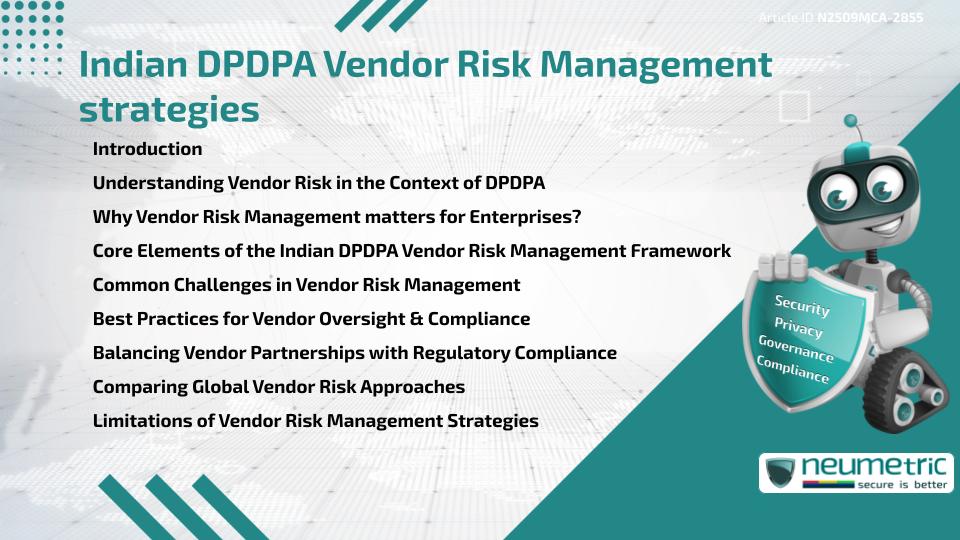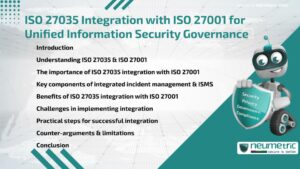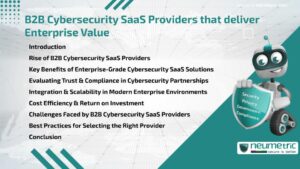Table of Contents
ToggleIntroduction
The Indian DPDPA Vendor Risk Management Framework plays a crucial role in ensuring that Enterprises comply with the Digital Personal Data Protection Act [DPDPA] while working with Third Party Vendors. Since Enterprises often rely on External Vendors for Data Processing, ensuring Vendor Compliance becomes just as critical as Internal Compliance. This article explains Why Vendor Risk Management is necessary, explores its challenges & outlines practical strategies for effective oversight.
Understanding Vendor Risk in the Context of DPDPA
Under the DPDPA, Enterprises remain accountable for the actions of their Vendors. This means that if a Vendor mishandles Personal Data, the Enterprise can still face Penalties. Vendor Risk includes Risks from Data Breaches, mishandling of Sensitive Data & inadequate Security Measures. The Indian DPDPA Vendor Risk Management strategies provide Enterprises with a structured approach to mitigate such Risks.
Why Vendor Risk Management matters for Enterprises?
Enterprises outsource operations for efficiency, but with outsourcing comes the Risk of losing control over how data is handled. Vendor Risk Management ensures that:
- Vendors follow Data Protection requirements.
- Enterprises maintain Business Objectives & Customer Expectations.
- Trust is built with Customers through Accountability.
- Regulatory fines & Reputational damage are minimised.
Without structured Vendor Oversight, Enterprises may unknowingly expose themselves to Non-Compliance.
Core Elements of the Indian DPDPA Vendor Risk Management Framework
Key elements include:
- Vendor Due Diligence: Assessing Vendor Policies & Data Handling practices before Onboarding.
- Contractual Safeguards: Incorporating clear Data Protection Clauses in Vendor Contracts.
- Ongoing Monitoring: Regular reviews of Vendor Compliance with DPDPA.
- Incident Reporting Mechanisms: Establishing protocols for Reporting & managing Data Breaches.
- Training & Awareness: Ensuring Vendors understand their Compliance obligations.
These components create a cycle of Accountability that keeps Enterprises & Vendors aligned.
Common Challenges in Vendor Risk Management
Enterprises often face several challenges, including:
- Complex Supply Chains: Multiple Vendors & Sub-Vendors make oversight difficult.
- High Costs: Maintaining thorough Vendor Assessments is resource-intensive.
- Resistance from Vendors: Vendors may be reluctant to share detailed Compliance Reports.
- Lack of Skilled Professionals: Many Organisations lack the expertise to assess Vendor Risks effectively.
These obstacles highlight the need for structured & practical strategies.
Best Practices for Vendor Oversight & Compliance
Enterprises can strengthen Vendor management by:
- Standardising due diligence Checklists.
- Automating Vendor Assessments & Compliance checks.
- Conducting regular Audits & Site visits.
- Providing Compliance training for Vendors.
- Establishing clear escalation protocols for Breaches.
These practices reduce Vulnerabilities & foster long-term Vendor Partnerships built on Trust.
Balancing Vendor Partnerships with Regulatory Compliance
A delicate balance must be maintained between building strong Vendor relationships & meeting Compliance Requirements. Overly strict oversight can strain Vendor relationships, while lax monitoring increases Risks. The Indian DPDPA Vendor Risk Management Framework encourages Enterprises to embed Compliance into Contracts & Operational workflows, ensuring Security, Availability, Processing Integrity, Confidentiality & Privacy while maintaining strong partnerships.
Comparing Global Vendor Risk Approaches
Global Frameworks such as GDPR & HIPAA emphasise Vendor Accountability & Ongoing Oversight. The Indian DPDPA Vendor Risk Management strategies align with these practices but adapt them to India’s diverse Vendor landscape, where Enterprises may work with both large multinational Vendors & smaller Local Partners.
Limitations of Vendor Risk Management Strategies
Despite its strengths, Vendor Risk Management has limitations:
- It cannot fully guarantee Vendor Compliance.
- Smaller Enterprises may struggle with Cost & Expertise.
- Over-reliance on automated tools can overlook nuanced Risks.
Recognising these limitations helps Enterprises set realistic expectations while strengthening oversight.
Takeaways
- Vendor Risk Management is critical for DPDPA Compliance.
- Enterprises remain accountable for Vendor Data Practices.
- Common challenges include high Costs, Vendor resistance & lack of Expertise.
- Best Practices include Due Diligence, Audits, Automation & Training.
- Strong Vendor partnerships require balancing Compliance & Trust.
FAQ
What is the Indian DPDPA Vendor Risk Management Framework?
It is a structured approach to managing Vendor Risks & ensuring Compliance with the Digital Personal Data Protection Act.
Why is Vendor Risk Management important under DPDPA?
Enterprises remain responsible for Vendor actions, making Oversight essential to avoid Penalties & build Trust.
Does the Indian DPDPA Vendor Risk Management Framework apply to all Vendors?
Yes, it applies to any Vendor that processes Personal Data on behalf of Enterprises.
What are common challenges in managing Vendor Risks?
Complex Supply Chains, high Costs, resistance from Vendors & lack of Skilled Professionals are common challenges.
How can Enterprises improve Vendor Risk Management?
By conducting Due Diligence, automating Assessments & training Vendors on Compliance.
Is Vendor Risk Management the same as Vendor audits?
No, Audits are periodic reviews, while Risk Management is an ongoing Framework that includes Monitoring, Training & Contractual safeguards.
Can Small Enterprises adopt Vendor Risk Management effectively?
Yes, but they may need simplified Processes, Outsourced Support or collaborative Vendor Agreements.
Does Vendor Risk Management eliminate all Risks?
No, it significantly reduces Risks but cannot eliminate them completely.
Need help for Security, Privacy, Governance & VAPT?
Neumetric provides organisations the necessary help to achieve their Cybersecurity, Compliance, Governance, Privacy, Certifications & Pentesting needs.
Organisations & Businesses, specifically those which provide SaaS & AI Solutions in the Fintech, BFSI & other regulated sectors, usually need a Cybersecurity Partner for meeting & maintaining the ongoing Security & Privacy needs & requirements of their Enterprise Clients & Privacy conscious Customers.
SOC 2, ISO 27001, ISO 42001, NIST, HIPAA, HECVAT, EU GDPR are some of the Frameworks that are served by Fusion – a SaaS, multimodular, multitenant, centralised, automated, Cybersecurity & Compliance Management system.
Neumetric also provides Expert Services for technical security which covers VAPT for Web Applications, APIs, iOS & Android Mobile Apps, Security Testing for AWS & other Cloud Environments & Cloud Infrastructure & other similar scopes.
Reach out to us by Email or filling out the Contact Form…





